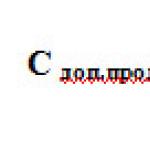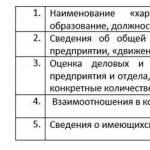Features of modern ethics. Historical forms of morality and modern ethics. Theoretical, applied, professional ethics
As the complexity of the world increases, the interdependence of people in society increases, the role and importance of moral values increases, including such as solidarity, responsibility, honesty, trust, ability to cooperate, mutual assistance, communitarianism (a modern synonym for collectivism).
It is moral values (the need for meaning, for social recognition and respect from others, for creative self-realization and socially useful activities) that increasingly act as the most important needs and motives for the social activity of a modern person (scientist, manager, entrepreneur, doctor or teacher).
Already in the 70s. XX century in the countries of the prosperous West, a very high standard of living was achieved, the quality of life of the population improved, which led to a value shift towards post-material needs: many people in Western countries felt, for example, the need to benefit people, to feel the approval of others. This qualitative shift was recognized as a value shift of postmodernity.
Associated with this cultural shift of postmodernity is the actualization of the role of ethics in human life and society, the awareness of the need to develop social capital and ensure social and economic order (and not only within individual communities, but also of humanity as a whole). These trends have intensified even more in our time.
At the beginning of the 21st century. In connection with the processes of globalization, relationships, contacts and interdependence of people are increasing, and new dangers, threats and risks are emerging, so the relevance of ethics is increasing many times over. The world is changing, the subject of ethics is changing and expanding.
The focus on the development of individual self-awareness is fundamental for modern ethics in all its forms (social, applied, professional, environmental).
In different cultures, in the course of their historical development, due to their original traditions and customs, their own systems of values and norms, myths and traditions were formed. The moral and religious values of different cultures do not coincide, which is the cause of contradictions and conflicts. These contradictions can take on a global character, but the main arena of struggle remains the inner world of man.
Theoretical, applied, professional ethics
Traditional ethics existed in two forms - religious and philosophical. Religious ethics, for example, the ethics of Christianity, contains a significant normative context in the form of commandments, prohibitions and practical norms of behavior, including ritual (observance of fasts, holidays, performance of rites and rituals of various kinds - calendar, wedding, etc.) Religious ethics also contains theoretical part consisting of dogmas, teachings, myths, symbols and traditions, the teaching of which forms the basis of religious upbringing and education. Religious ethics considers the same problems as philosophical ethics, but in the context of faith.
Actually theoretical ethics arose in ancient society along with philosophy as a sphere of rational thinking about the world and man. The specificity of ethics as a science is that it talks about due those. how must what a person should do (about moral values as the goals of existence), what society should be like, what the rules of behavior (norms) should be.
Aristotle already understood that ethics differs significantly from physics or mathematics. Ethics is a special kind of knowledge. He distinguished three types of knowledge: theoretical, practical and ethical.
Theoretical knowledge (episteme, or the form of “contemplation of eternal ideas”) characterizes such sciences as mathematics, physics, and biology.
Practical knowledge (techne) appears in the form skills (a builder knows how to build a house, an artist knows how to paint pictures, an artist knows how to depict various feelings, a craftsman knows how to make goods, a shoemaker knows how to sew boots, etc.).
Ethical knowledge (phronesis) is knowledge of a very special kind, which consists not so much in reasoning or skills, but in correct behavior, performing virtuous acts, and a moral attitude towards another person, including mercy and benevolence. For example, a lawyer, when passing a sentence, is guided not only by knowledge of the crime committed, but also by an understanding of the situation, the ability to put himself in the place of another person (both the criminal, the victim, and other people), feelings of justice, mercy, empathy and compassion. He knows how to do the right thing, i.e. he has not only knowledge of facts, but also ethical knowledge and understanding of the situation.
The subject of traditional ethics is man as a moral individual, the problems of the struggle between good and evil, virtues and vices in his soul. The main goal of traditional philosophical ethics is the development of the self-awareness of an individual, the formation of his ability for moral and spiritual self-improvement. According to legend, Confucius even said that a person, if he does not develop as a cultural, moral being, becomes worse than an animal; In relation to such people, the state has the right to apply the most severe punishments. Thus, Confucian ethics already set the space for the formation of life-meaning guidelines and spiritual development: the lower bar is inevitable cruel punishment, the upper bar is respect, honor, the high social status of a noble husband.
Traditional ethics was not only theoretical, but primarily normative (prescriptive) in nature, since the theoretical justification of the values of human existence was also a prescription, a moral requirement, a norm, for example, the theoretical definition of virtue presupposed its dissemination, theories of beneficence contribute to the spread of charity. The value of goodness is in becoming kind, happiness - in becoming happy, love - in learning to love and be loved, justice - in its practical implementation.
The main achievements of traditional ethics are expressed in its normative programs. There are such programs as the ethics of pleasure (hedonism), the ethics of happiness (eudaimonism), the ethics of simplification (cynicism), the ethics of contemplation, the ethics of duty (Stoics, Kant), the ethics of love and mercy, the ethics of compassion (A. Schopenhauer), the ethics of utility ( utilitarianism), ethics of heroism, ethics of reasonable egoism (utilitarianism), ethics of non-violence (L. Tolstoy, M. Gandhi), ethics of reverence for life (A. Schweitzer), etc.
It is no coincidence that ethics as a special type of knowledge received the name from Kant practical philosophy. If theoretical reason becomes entangled in contradictions and antinomies (which, according to Kant, is evidence of its imperfection), then practical reason quite easily resolves these antinomies, namely, it recognizes the need for free will, the immortality of the soul and the existence of God as necessary conditions for the existence of morality.
Nevertheless, traditional ethics contains a significant theoretical part, including discussions about the origin and nature of morality, its historical forms and essence, consideration of the specifics of morality, its role in the life of society and the individual, the structure of moral consciousness, the categories of good and evil, happiness, duty, fidelity , honor, justice, meaning of life. The specificity of ethics lies in the fact that it has never been a pure theory, but has always contained theoretical and practical (normative) parts in equal proportions.
The beginning of the century was marked by a surge of ethical thought. Never in the history of Russian culture has there been such a diversity of ethical ideas and trends, and never has ethics been so close to becoming a socially significant and ideologically effective component of the new social consciousness, exerting a real influence on the spiritual life and social institutions of society. This ethical wave began to decline only at the beginning of World War I and finally subsided by the mid-20s, which, naturally, was associated with the expulsion of Russian philosophers and the “split” of ethical thought.
The trends that emerged in ethics at the end of the 19th century continue to develop in the 20th century. The development of scientific-rationalist trends in ethics (pragmatism, positivism) continues, originating from German classical philosophy and seeking to focus on issues related directly to technical progress in the methodology of natural science, which, as it were, takes ethics beyond the scope of science itself. New systems of irrationalistic ethics are emerging: psychoanalysis, existentialism, personalism, etc. Already existing religious and ethical directions are being improved, taking into account progress in science and technology: neo-Protestantism, neo-Thomism. Let us consider sequentially the most significant of them.
Emrich Seligmann Fromm (March 23, 1900, Frankfurt am Main - March 18, 1980, Locarno) - German sociologist, philosopher, social psychologist, psychoanalyst, representative of the Frankfurt School, one of the founders of neo-Freudianism and Freudo-Marxism.
In the works “To Have or to Be?”, “Man for Himself”, “Flight from Freedom”, etc., the “collective unconscious” can be reduced to two fundamental attitudes: the primary one is “biophilic” (Eros), aimed at self-realization, the desire “ to be”, to realize their creative inclinations, and the secondary - “necrophilic” (Thanatos), striving to “have”, to appropriate the surrounding reality - therefore, to destroy it and self-destruct. These tendencies in different periods of human history alternately occupy a dominant position in culture, or exist in one or another combination. They leave their mark on the moral structure of the individual and determine the prevailing moral relations in society.
Jean-Paul Charles Emamre Sartre (June 21, 1905, Paris - April 15, 1980, ibid.) - French philosopher, representative of atheistic existentialism (in 1952-1954 Sartre took positions close to Marxism), writer, playwright and essayist, teacher Winner of the Nobel Prize in Literature in 1964 (refused the prize).
One of the central concepts for Sartre's entire philosophy is the concept of freedom. For Sartre, freedom was presented as something absolute, given once and for all (“man is condemned to be free”). It precedes the essence of man. The concept of “alienation” is associated with the concept of freedom. Sartre understands the modern individual as an alienated being: his individuality is standardized (as a waiter with a professional smile and precisely calculated movements is standardized); subordinated to various social institutions that seem to “stand” above a person, and do not originate from him (for example, the state, which represents an alienated phenomenon - the alienation of the individual’s ability to take part in the joint management of affairs), and, therefore, is deprived of the most important thing - - the ability to create your own story.
The essence of dialectics lies in synthetic unification into integrity (“totalization”), since only within integrity do dialectical laws make sense. The individual “totalizes” material circumstances and relationships with other people and creates history himself - to the same extent that it creates his.
Moral problems of our time:
Female alcoholism
Recently, the problem of female alcoholism has become increasingly urgent. The number of women drinking exceeded 50%.
From a medical point of view, female alcoholism is a type of drug addiction. Drug addiction is a disease caused by genetic disorders and, as a consequence, disruption of certain areas of the brain - the so-called satisfaction system.
Causes of female alcoholism:
A feature of female alcoholism is that it has a greater psychological background than that of men. Most often, women develop an addiction to alcohol due to loneliness (family breakdown, loss of loved ones, death of relatives). Housewives who sacrifice their careers and work for the sake of family happiness are subject to stress. The children grow up, the husband disappears at work, and begins to cheat on his wife. On this basis, loneliness, a feeling of disappointment in life, and resentment arise. Women react more emotionally to stressful situations, “immerse themselves,” seek immediate resolution, a way out of the situation, and wait for support. In the absence of support, alcohol comes to the rescue, which in the initial stages of use brings relief and gives a feeling of “ecstasy.” In addition, the availability of alcohol plays a role.
Alcohol addiction develops faster in women than in men.
This often goes unnoticed by relatives, because... Because of society’s condemnation and rejection of women who drink, they try to hide their alcohol abuse and often drink alone or in the company of friends.
A woman who drinks alcohol looks much older than her age.
The voice becomes rough and harsh. Doesn't take care of his appearance. Alcohol-induced personality changes are characteristic: aggressiveness, rudeness, deceit. A woman neglects family responsibilities and becomes sexually promiscuous.
Typically, women's alcohol consumption begins with weaker drinks, and for a long time is of an episodic nature. Most often, women drink secretly and alone. Sometimes there are binges lasting 1-2 months, which are replaced by sober periods.
In general, alcoholism develops faster in women than in men. The duration of the first stage from the beginning to systematic use to the onset of physical dependence is from one to three years.
An analysis of statistical and sociological data reflecting the characteristics of the spread of drunkenness and alcoholism among women indicates that the problem is poorly developed and that there are no substantiated recommendations for the prevention and eradication of this negative phenomenon. Measures used in practice do not always take into account the specific characteristics of female drunkenness and alcoholism.
The end of the 19th and 20th centuries became turning points and tragic for all humanity: revolutions, world wars, division of the world into 2 hostile camps. This, of course, affected the development of modern ethical concepts. Only 2 of them have become the most widespread: the ethics of violence and the ethics of non-violence.
Modern ethics violence. The spokesmen for the ideas of violence were: Karl Marx, F. Nietzsche and E. Dühring. Dühring and Nietzsche assigned violence a decisive role in the history of mankind. They considered sacrifices during a change of power and system justified, believed that a person has the right to radically change social life if it does not meet his aspirations, and those who do not want this can be forced under the threat of violence to do what they do not want. Marx and Engels, who debated with Dühring regarding the denial of violence, nevertheless became the founders of the practice of violence and elevated it to the rank of the current law of any revolution. The destruction of people takes place when the social structure changes. The ethics of violence continued to develop in the works of Lenin, and was applied directly by him in practice - the dictatorship of the proletariat. This ethic gave birth to the bloodiest dictatorships of the 20th century - Stalinism and Hitlerism.
Modern ethics of nonviolence. It arose in opposition to the ethics of violence, which became widespread in the 20th century. The main ethical principle of this direction is the absence of any violence against the individual, both moral and physical. Through this, a person builds relationships with nature and the people around him.
A significant role in the development of ethical categories of non-violence belongs to Leo Tolstoy. He believed that through violence people justify the presence of their most negative vices: evil, self-interest, envy, lust for power. But these qualities are destructive, first of all, for their bearer. You should change your moral values, come to God and accept the main principle of Christianity - you cannot respond with evil to violence.
The name of another exponent of the ethics of nonviolence, M. L. King, is associated with the opening of the Institute of Nonviolence in New York. He substantiated the basic principles of philanthropy, as well as methods for their development in oneself. King understood that the implementation of these principles is not an easy task, but it is the key to ensuring human survival. Love should become the driving force of any person, even towards his enemies. Hence, an important quality of self-education is forgiveness.
The ideas of another 20th century humanist, Gandhi, also became famous. He fought for the independence of his country exclusively peacefully. Gandhi believed that the principles of non-violence are inherent only to strong people who have raised them through reason. The laws of love are as effective in the world as the laws of gravity - a loving person receives a lot in return. Harmony of reason and love in a person is the real foundation of non-violence.
The pinnacle of the ethic of nonviolence was the ethic of reverence for life developed by Albert Schweitzer. Nurturing love, forgiveness, and respect for others in the soul is possible through contemplation of the perfect structure of nature and man by the Creator. Schweitzer's ethics are practical, it involves cultivating in oneself the necessary qualities that will bring harmony to a person's life.
Modern ethics is faced with a rather difficult situation in which many traditional moral values have been revised. Traditions, which previously were largely seen as the basis of the original moral principles, often turned out to be destroyed. They have lost their importance due to global processes developing in society and the rapid pace of change in production, its reorientation towards mass consumption. As a result, a situation arose in which opposing moral principles appeared as equally valid, equally deducible from reason. This, according to A. MacIntyre, led to the fact that rational arguments in morality mainly began to be used to prove theses that those who presented these arguments already had in advance.
This, on the one hand, led to an anti-normative turn in ethics, expressed in the desire to proclaim an individual person as a full-fledged and self-sufficient subject of moral demands, to place on him the full burden of responsibility for independently made decisions. The anti-normative tendency is represented in the ideas of F. Nietzsche, in existentialism, in postmodern philosophy. On the other hand, there was a desire to limit the area of ethics to a fairly narrow range of issues related to the formulation of such rules of behavior that can be accepted by people with different life orientations, with different understandings of the goals of human existence, and the ideals of self-improvement. As a result, the category of good, traditional for ethics, seemed to be taken beyond the boundaries of morality, and the latter began to develop mainly as an ethics of rules. In line with this trend, the topic of human rights is further developed, and new attempts are made to build ethics as a theory of justice. One such attempt is presented in J. Rawls’s book “A Theory of Justice.”
New scientific discoveries and new technologies have given a powerful boost to the development of applied ethics. In the 20th century Many new professional codes of morality were developed, business ethics, bioethics, legal ethics, media workers, etc. were developed. Scientists, doctors, and philosophers began to discuss problems such as organ transplants, euthanasia, the creation of transgenic animals, and human cloning. Man, to a much greater extent than before, felt his responsibility for the development of all life on Earth and began to discuss these problems not only from the point of view of his own interests of survival, but also from the point of view of recognizing the intrinsic value of the fact of life, the fact of existence as such (Schweitzer, moral realism).
Professional ethics acts as an ethics of rules and works at the level of creating deontological principles of behavior for those who belong to a given profession. It constitutes a significant area of applied ethics. But there are other areas. This is a corporate ethics in which codes and organizations that enforce them are created for the members of certain corporations. The field of applied ethics also includes what is associated with social threats of a global nature. To prevent these threats, humanitarian examinations are being carried out, and mechanisms for democratic procedures for making important public decisions are being worked out.
An important step, representing a reaction to the current situation in the development of society, was an attempt to understand morality as an endless discourse - a conversation of humanity aimed at developing solutions acceptable to all its participants. This is developed in the works of K.O. Apel, J. Habermas, R. Alexi and others. The ethics of discourse is directed against anti-normativism; it tries to develop common guidelines that can unite people in the fight against the global threats facing humanity. Discursive ethics assumes that all decisions in the future of the development of society should become communicative. These are decisions that people agree to voluntarily make because they are convinced of their appropriateness, and not because they are promised something or are intimidated with something (strategic decisions). Communicative solutions mean that people's interests are not suppressed or eliminated in the name of other interests, and those who become the object of planned management agree to the manipulations made with their interests.
Another characteristic feature of modern morality is the incredible expansion of the public sphere, i.e. spheres where the interests of large groups of people are represented, where actions are assessed from the point of view of the perfection of performing certain social functions. In this area, we are faced with the activities of politicians, leaders of political parties, economic managers, and the mechanism for making global decisions. It turned out that traditional ethics is largely not applicable to this area, because it is clear that, say, a lawyer cannot treat a prosecutor as himself. During the trial, they act as opponents.
Therefore, theorists raise the question of developing a new ethics related to the adoption of fair rules of a certain game, a new understanding of justice, including the inclusion in this concept of issues of international justice, attitude towards future generations, attitude towards animals, attitude towards people with disabilities from birth, etc. .
Questions:
1. What is the origin of the term ethics?
2. What is motivation?
3. How does the “golden rule” differ from the “talion”?
4. What is a moral rationale?
5. What was specific to ancient ethics?
6. What are the specifics of the ethics of the New Time
7. What are good and evil? Can these categories be opposed in an absolute sense?
8. How can morality be defined?
9. How does morality differ from other means of social regulation?
10. What is the situation in modern ethics?
11. What is discourse ethics?
Abstract topics:
1. The emergence of morality
2. The golden rule of morality
3. Aristotle's ethics
5. Justification of morality: possibilities and limits
7. Love as a principle of moral relationships
8. Ethics of Discourse
Literature:
1. Aristotle, Nicomachean Ethics //Aristotle. Works in four volumes. T.4. M.: Myso 1984.
2. I. Kant Fundamentals of the metaphysics of morals // Kant I. Sobr. Op. in 8 vols. T. 4. M.: CHORO, 1994.
3. Apel K.-O. Transformation of philosophy. M.: Logos, 2001.
4. Guseinov A.A. Great prophets and thinkers. Moral teachings from Moses to the present day. M.: Veche, 2009.
5. Guseinov A.A. Apresyan R.G. Ethics. M.: Gardariki, 2000.
6. MacIntyre A. After virtue. M.: Academic project; Ekaterinburg: Business book, 2000.
7. Razin A.V. Ethics. M.: INFRA-M, 2012.
8. Habermas Yu. Moral consciousness and communicative action. Per with him. St. Petersburg: Nauka, 2000.
Among the moral theories of the 20th century, special attention should be paid to the ethics of nonviolence, which is finding an increasing number of adherents around the world. Historically, there has been and still continues to exist a tradition of resolving various state, national, and interpersonal problems from positions of strength. The ethics of nonviolence is a completely different approach to conflict resolution that excludes violence. The ideas of non-violence are formulated in the Bible, in the New Testament, which recommends that “if someone hits you on your right cheek, turn to him the other as well.” This case reflects a certain ideal, according to which non-resistance to evil is seen as a manifestation of moral perfection, moral superiority over the sin of others. The non-increase of evil is regarded as a manifestation of good. The corresponding biblical commandments were established with great difficulty in human consciousness and still seem impossible to many. The ethics of non-violence received significant development in the works of the outstanding Russian writer and thinker L.N. Tolstoy (1828-1910), who believed that recognizing the need to resist evil with violence is nothing more than people’s justification of their usual favorite vices: revenge, self-interest, envy, anger, lust for power. In his opinion, the majority of people in the Christian world feel the misery of their situation and use to deliver themselves the means that, according to their worldview, they consider valid. This means is the violence of some people over others. Some people, who consider the existing state order beneficial for themselves, try to maintain this order through the violence of state activity, while others, through the same violence of revolutionary activity, try to destroy the existing system and install another, better one in its place. L. Tolstoy finds the mistake of political teachings in the fact that they consider it possible to unite people through violence so that they all, without resisting, submit to the same structure of life. “All violence consists in the fact that some people, under the threat of suffering or death, force other people to do what those being raped do not want.” Violence does not create anything, it only destroys. The one who returns evil for evil multiplies suffering, intensifies disasters, but does not deliver either others or himself from them. Thus, violence is powerless, fruitless, destructive. It is not without reason that even in the teachings of the ancient sages, love, compassion, mercy, repaying good for evil were considered the basis of moral relations. Another proponent of this theory is M. Gandhi, who dreamed of achieving India's freedom peacefully
means, considered non-violence a weapon of the strong. Fear and love are contradictory concepts. The law of love operates just as the law of gravity operates, whether we accept it or not. Just as a scientist works miracles by applying the law of nature in different ways, so a person who applies the law of love with the precision of a scientist can
create even greater miracles. Nonviolence does not mean passivity, it is active and involves at least two forms of struggle: non-cooperation and civil disobedience. Ideas of non-violence as a means of resolution
conflicts and problems is finding an increasing number of its supporters around the world.
One of the most interesting philosophical concepts of the 20th century is the ethics of reverence for life, the founder of which is the outstanding humanist of our time, Albert Schweitzer. At the heart of this theory is the principle of reverence for life in any form, alleviating the suffering of all living ones. Reverence for life, according to A. Schweitzer, applies to both natural and spiritual phenomena, since reverence for natural life necessarily entails reverence for spiritual life. “What they find especially strange in the ethics of reverence for life is that it does not emphasize the difference between higher and lower, more valuable and less valuable life. She has her reasons for doing this. For a truly moral person, all life is sacred, even that which, from our human point of view, seems inferior,” he notes. Equalizing the moral value of all existing forms of life, A. Schweitzer, however, fully admits the situation of moral choice: “Being, together with all living beings, under the influence of the law of self-division of the will to live, a person increasingly finds himself in a position where he can save his life ,
like life in general, only at the expense of another life. If he is guided by the ethic of reverence for life, then
he harms life and destroys it only under the pressure of necessity and never does it thoughtlessly. But where he is free to choose, man seeks a position in which he could help life and avert from it the threat of suffering and destruction.” Understanding how difficult the fate of those who follow his ideas is, A. Schweitzer draws attention to the need for self-denial as a means of activity. Self-denial does not devalue a person’s personality, but helps to free oneself from selfishness and bias in assessing others. It is necessary to fight evil, but not with the means of evil, not with revenge, stopping the spread of evil. In this situation, the views of A. Schweitzer are close to the ideas of supporters of the theory of non-violence. He considers the need for forgiveness to be one of the means of preventing evil from entering the human soul, thereby neglecting evil and excluding it. This method of preventing evil allows a person to be freed from the torment of moral choice and the need to search for self-justification. “True ethics begins where words cease to be used.” This statement by A. Schweitzer contains a deep meaning. His entire ethical concept calls for active, purposeful activity, preservation of all existing forms of life, selfless service to people, giving them a piece of his life, participation, love, kindness.
5. Plato and Aristotle on ethics. Ethics of Plato (427-347 BC) Plato made, at first glance, an incredible, but in fact quite logical assumption: if virtue is not rooted in this world, then there is probably another world, the reflection and expression of which it is. Plato constructs a new world - in order to lay the foundation for moral concepts, to ensure their existence. He was forced to do this. Once the task was set to rationally comprehend morality and suddenly it turned out that moral concepts were hanging in the air, homeless, then it was necessary either to abandon these concepts, which the sophists did, or to invent another world for them, to build a house commensurate with them. This is what Plato did, constructing a world of ideas in which the idea of good is supreme. The world of ideas is not just better than the real world, it is perfect. It differs from the real world as an original from a copy; in relation to the latter, it is the beginning, the cause, the image, and the model. Plato introduces a number of epistemological specifications that he needs in order to substantiate the possibility of knowledge of morality. He distinguishes two types of understanding (knowledge) and two types of pleasure. One type of reason and knowledge is aimed at that which does not arise and does not perish, but remains eternally unchanged, always identical to itself. The subject of another type of reason and knowledge is that which arises and perishes. The first type of destruction and knowledge is higher than the second. As for pleasure, the first type includes proportionate pleasures. They are not associated with suffering, they are carefree. The lack of them is unnoticeable, their replenishment is noticeable and pleasant. They are not strong. Their source is the beautiful and the virtuous. Pleasures of the second type are characterized by immensity, bring excitement into the soul, and are always associated with suffering. These are anger, pride, fear and similar feelings. In a word, as Plato says, there are pleasures from gentle sounds, and there are pleasures from tickling. There is nothing in common between them. Only pleasures of the first type are included in the structure of virtue, but they also occupy the last place there. The path of virtue is an ascending path of knowledge of beauty, which can only end when the soul sees the eternal, and love for truth is not overshadowed by anything. Ethics of Aristotle (384-322 BC) Aristotle's ethics is the pinnacle of ancient ethics. It was he who introduced the term “ethics” and systematized ethical ideas and knowledge. Aristotle gave the most profound understanding of ethics for his time as the doctrine of virtues, of a virtuous personality. Unlike philosophy, ethics is a practical science. The goal of ethics is not knowledge, but actions. She teaches how to become virtuous. That is, ethical studies do not aim only at contemplation. Of course, ethics, like any science, produces knowledge. However, ethical knowledge does not have value in itself; they are a form of actualization of behavioral tasks and are designed to guide human activity. They turn into norms, into requirements for behavior. Aristotle has two main definitions of a person: a person is a) a rational (thinking) and b) a political (polis) being. They are interconnected in such a way that a person becomes a polis being to the extent that he realizes his capabilities as a rational being. The polis is the embodied, objectified mind. If in general Aristotle understands activity (practice) as the actual existence of a living being, the transition of its capabilities into reality, then the polis is a specific form of human practice. And morality is simply the optimal form of exercising reason both when it comes to an individual and when it comes to a polis. It finds its flesh in virtues. Ethical virtues, according to Aristotle, are a special class of human qualities; they develop as a result of such a relationship between reason and affects, when the former guide the latter. They coincide with a reasonable measure in affects, and a reasonable measure (the famous Aristotelian mean) in turn is established by correlation with the usual forms of polis behavior. Individual virtue and polis expediency mutually rely on each other. Virtue acts as a form of expediency, albeit a special one, relating, on the one hand, to human character as a whole, and on the other, to the life of the entire polis. At the same time, the very expediency of polis life is supported by the virtue of individuals. There are three mental states, two of which are vicious. One due to excess, the other due to deficiency. Vices go beyond what is due either towards excess or towards deficiency. Virtue knows how to find the middle and chooses it. For example, courage is the middle of fear and insane courage; generosity is the middle of stinginess and wastefulness, etc. The desire for the middle is the content of moral freedom, moral choice. Ethical virtues begin when not a simple desire for pleasure, but a balancing reason becomes the guiding principle of behavior. Virtues act as prescribed by correct judgment. Aristotle gives ethics and ethical virtues a secondary, auxiliary, applied character. This approach excluded the very formulation of the question of mandatory moral laws, generally valid criteria for distinguishing between good and evil. The measure of virtuous behavior is always specific, it is especially specified in relation to each virtue and, moreover, it is always individualized. For example, there is no such set of objective signs that would allow us to establish whether actions are fair, because for this they must also be correlated with the individual who commits them. And Aristotle comes to the conclusion that actions are then just when they are such that a just person could have committed them. Aristotle created ethics that completely ignores the claims of morality to absoluteness, autonomy and holiness. In this sense, he extremely rationalized morality. He saw in it a certain dimension of a person, which he sets for himself in accordance with his nature and living conditions and which may well be under his control. It is important to emphasize: in the study of ethical virtue, Aristotle reached the point where demonstrative judgment turns out to be impossible and one has to accept the truth without indicating its grounds.6. The concept and content of the main categories of ethics.





